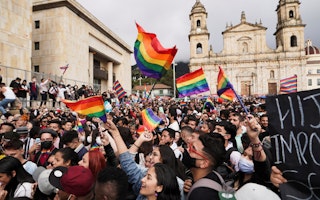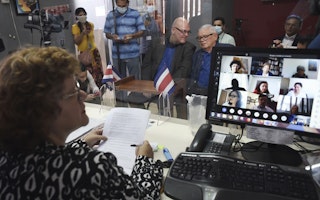Kyrgyzstan’s New Anti-Gay Law Is Even Worse than Russia’s
By Syinat Sultanalieva
In a few months, writing these words might get me thrown in prison.
I live in Kyrgyzstan, where soon any public mention of homosexuality will likely be forbidden by law.
That’s because in October, the Kyrgyz version of the notorious Russian law against “gay propaganda” passed its first reading by a vote of 79 to 7. Following one more reading, the bill will reach President Almazbek Atambayev’s desk, where it is almost certain to pass into law. Legislators even proposed that the minimum sentence for making reference to homosexuality be increased from one year to three.
Kyrgyzstan’s close affiliation with Russia inspired the law, and the Kyrgyz version is even tougher. To protect “traditional Kyrgyz values and families,” the law states, any “positive image of nontraditional sexual relations” will be prohibited. Anyone caught distributing a photo, writing an article, or posting on Facebook about homosexuality will face up to a year imprisonment.
The law will effectively make it illegal to advocate for, provide information about, or even organize a peaceful assembly in support of LGBT rights. Human rights organizations like my own will cease to exist as our current activities will be deemed unlawful.
This violates Kyrgyzstan’s commitments under both international law and its own constitution, which protects the right to peaceful assembly, free access to information, and freedom from any form of discrimination. In a society as homophobic as Kyrgyzstan’s, the law will only encourage more anti-gay crimes. In fact, one form of speech that’s not criminalized under the new law is homophobic hate speech.
Being LGBT in Kyrgyzstan today means being exposed to blatant violence. In the past, cases of violence were sporadic, but today they are systematic, premeditated, and executed by groups. Since 2008, human rights organizations in Kyrgyzstan have documented over 200 cases of homophobic attacks, ranging from beatings on the street to raids of the offices of LGBT rights organizations.
The crimes begin in our own families, which disown us and force us out of our homes. Many among us have suffered horrific sexual violence, including so-called corrective rape. If you dare to report these crimes to the police, the abuse continues.
Severe and prolonged beatings, threats of rape, and denial of food and water are some of the testimonies from victims whose only crime is being gay or bisexual. A report by Human Rights Watch released earlier this year suggests that these abuses by the police have on occasion risen to the “level of torture.”
The space for the LGBT community in Kyrgyzstan is shrinking. If passed, this discriminatory law will serve as an instrument for even more repression. It’s not just about LGBT rights. It’s about the broader, long-term implications for our country. Outlawing any public expression of identity threatens the fundamental rights and freedoms of Kyrgyz society as a whole.
Labrys is a grantee of the Open Society Foundations.
Syinat Sultanalieva is the coordinator of the organizational development program at Labrys, an LGBT rights organization in Kyrgyzstan.


